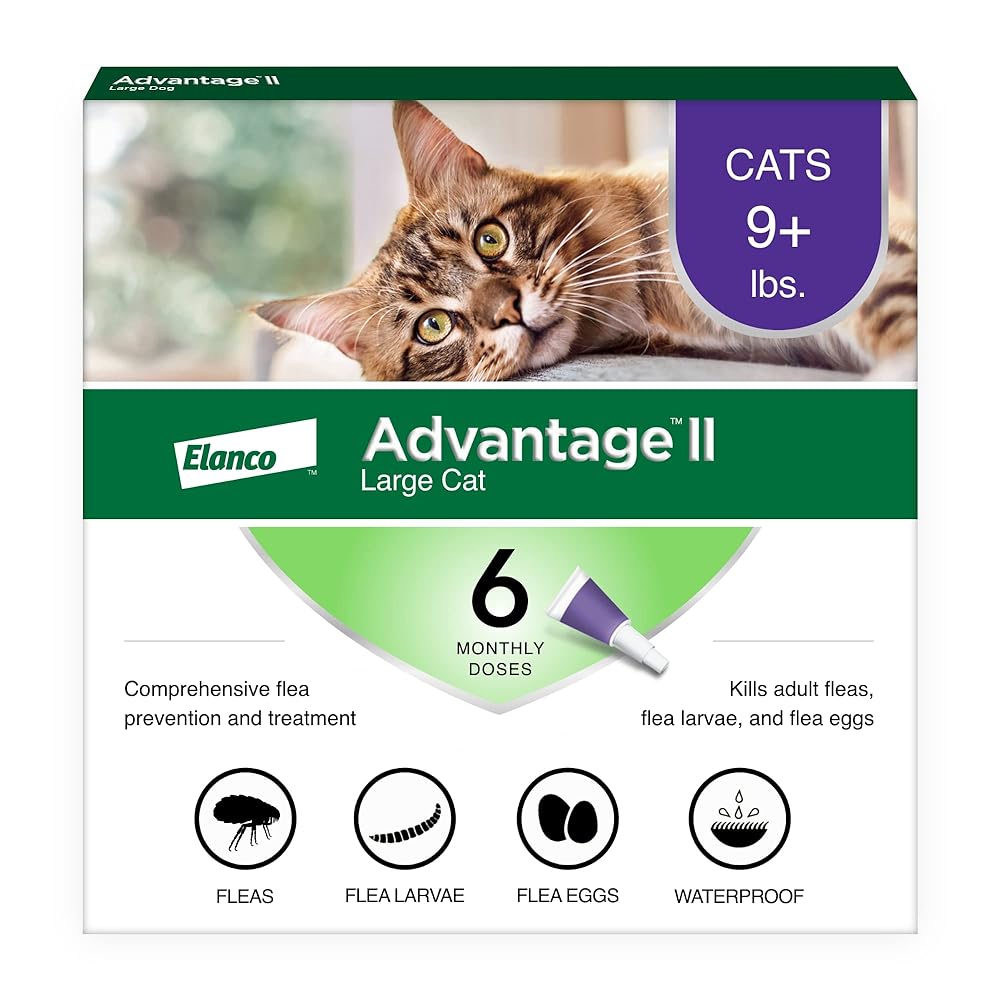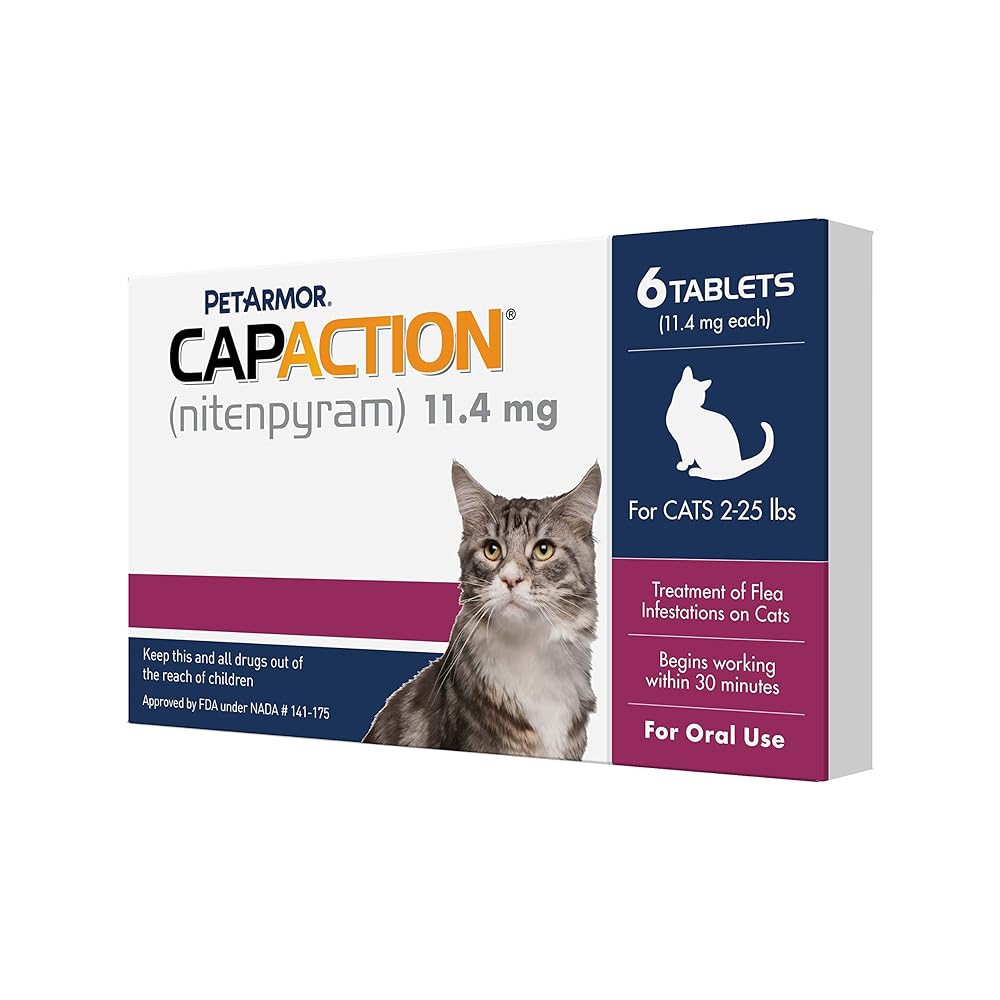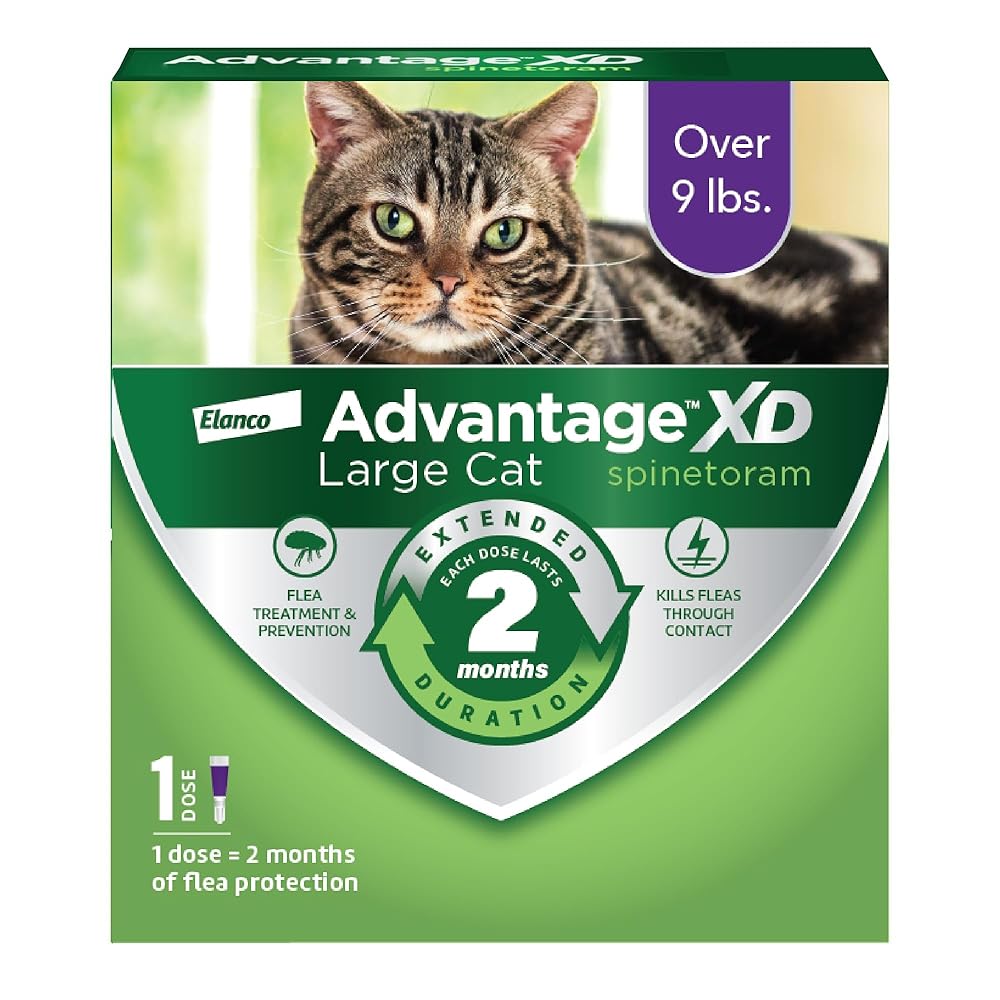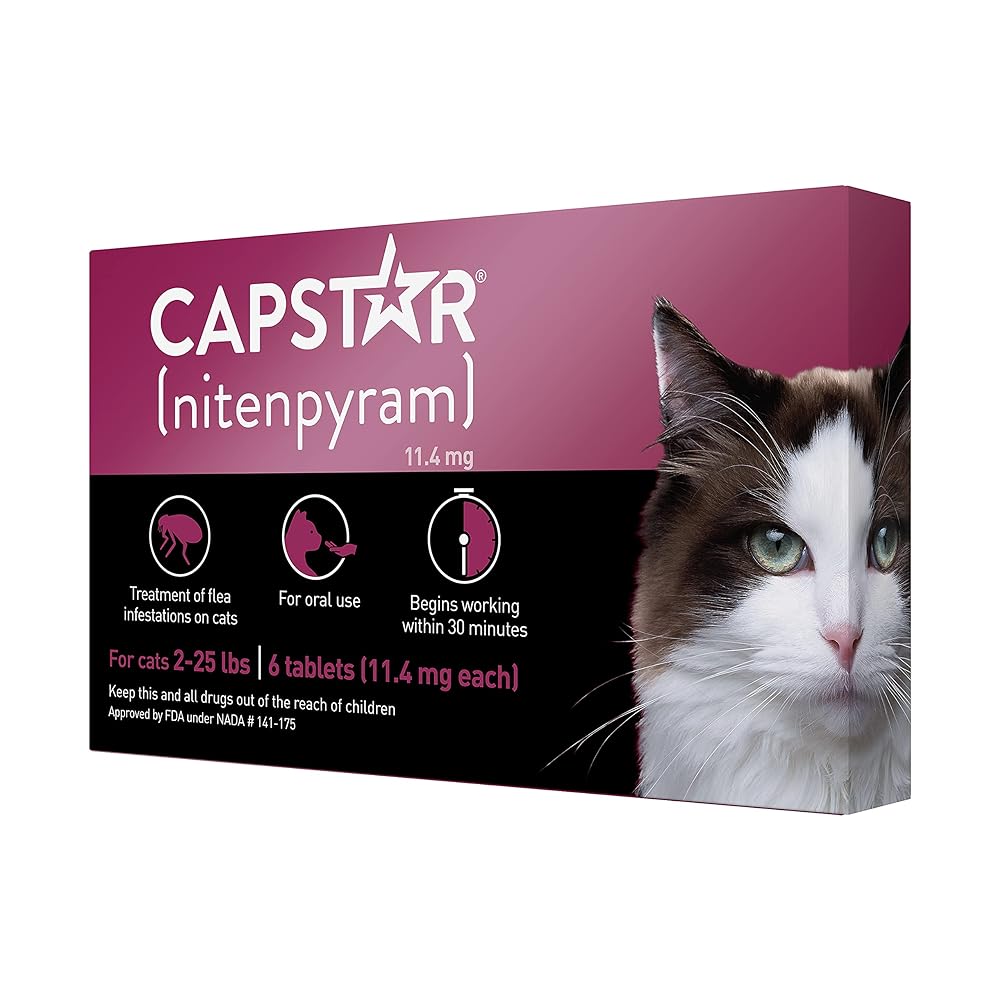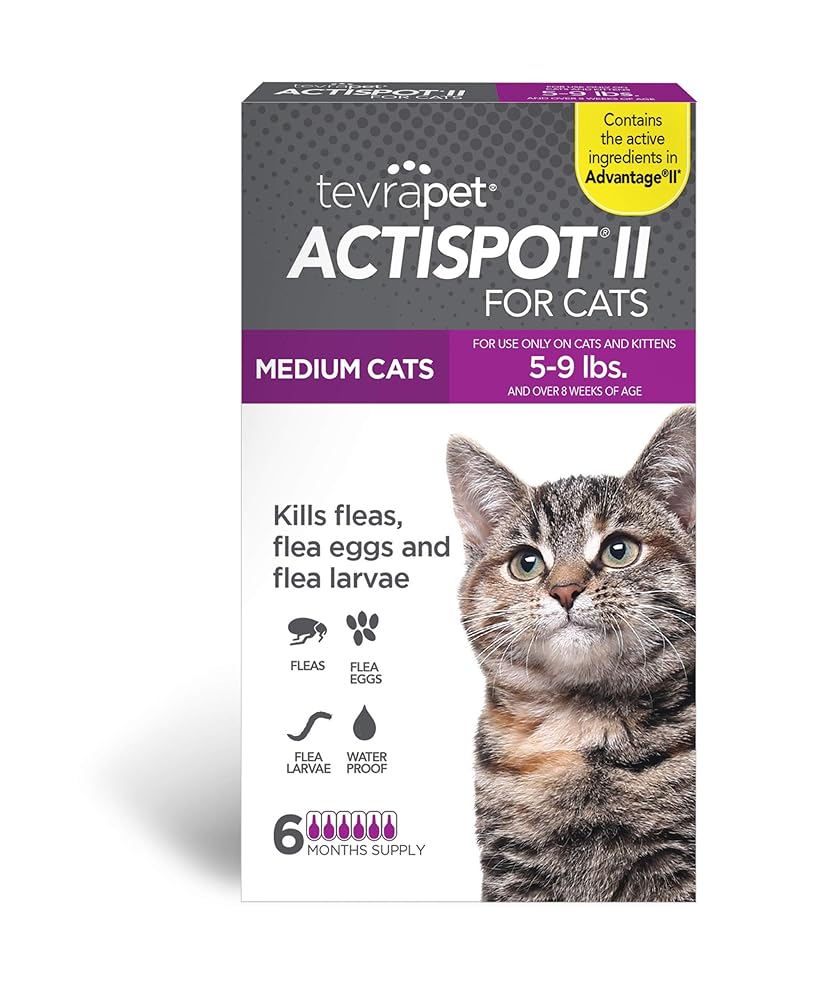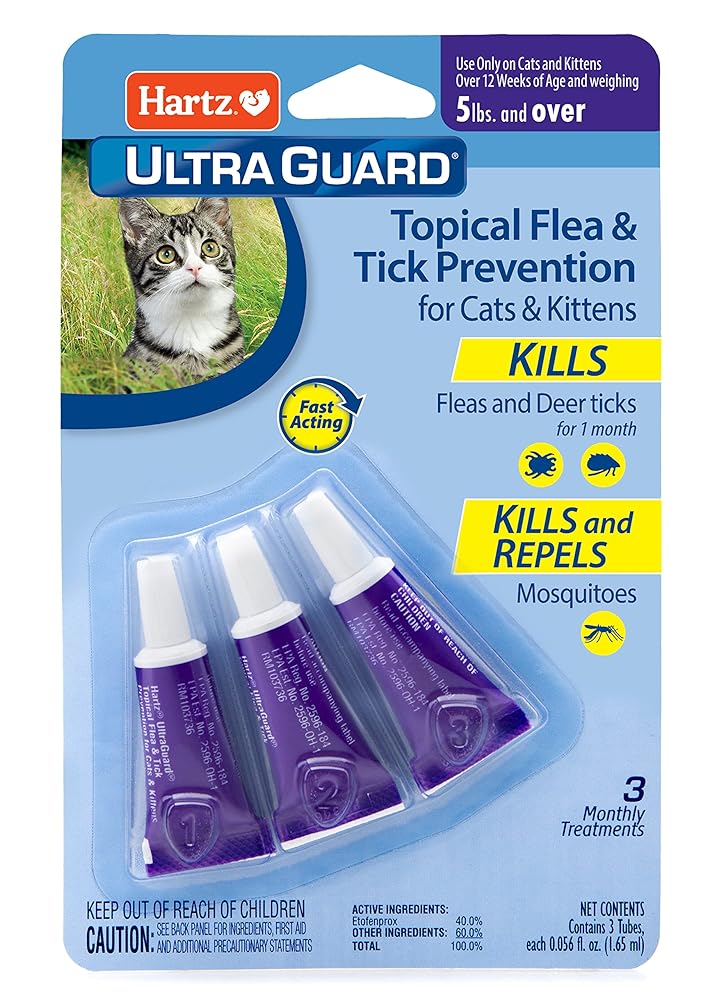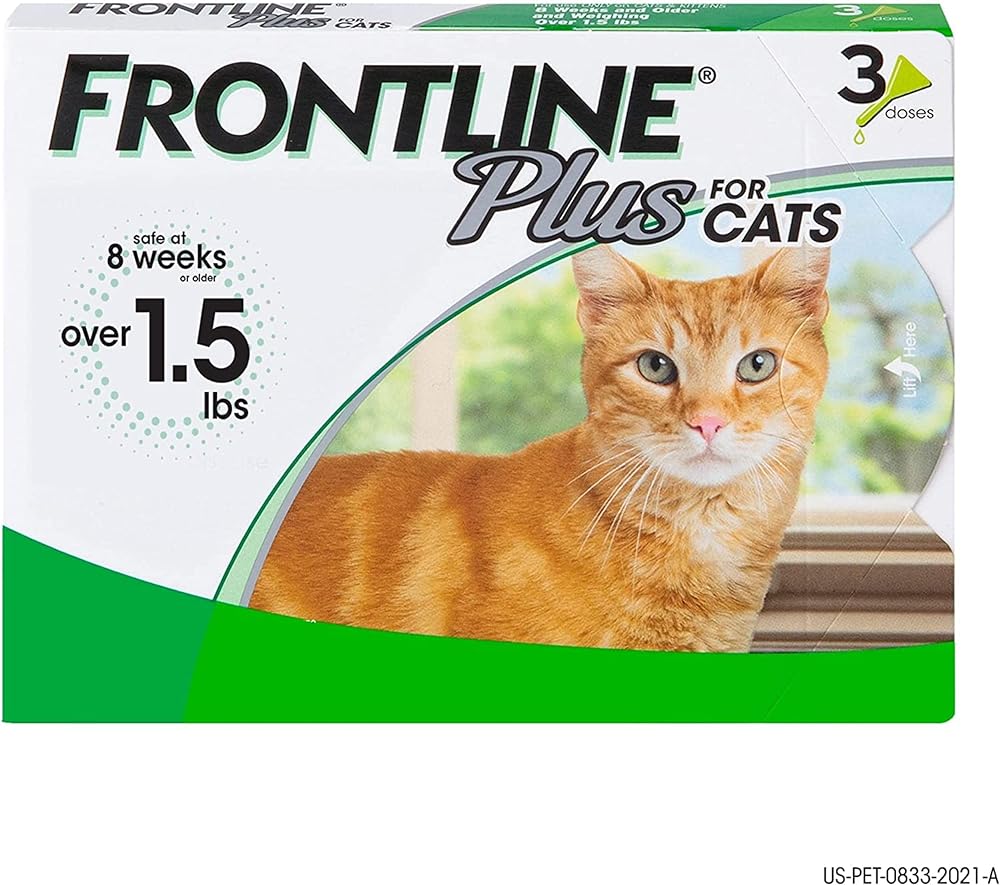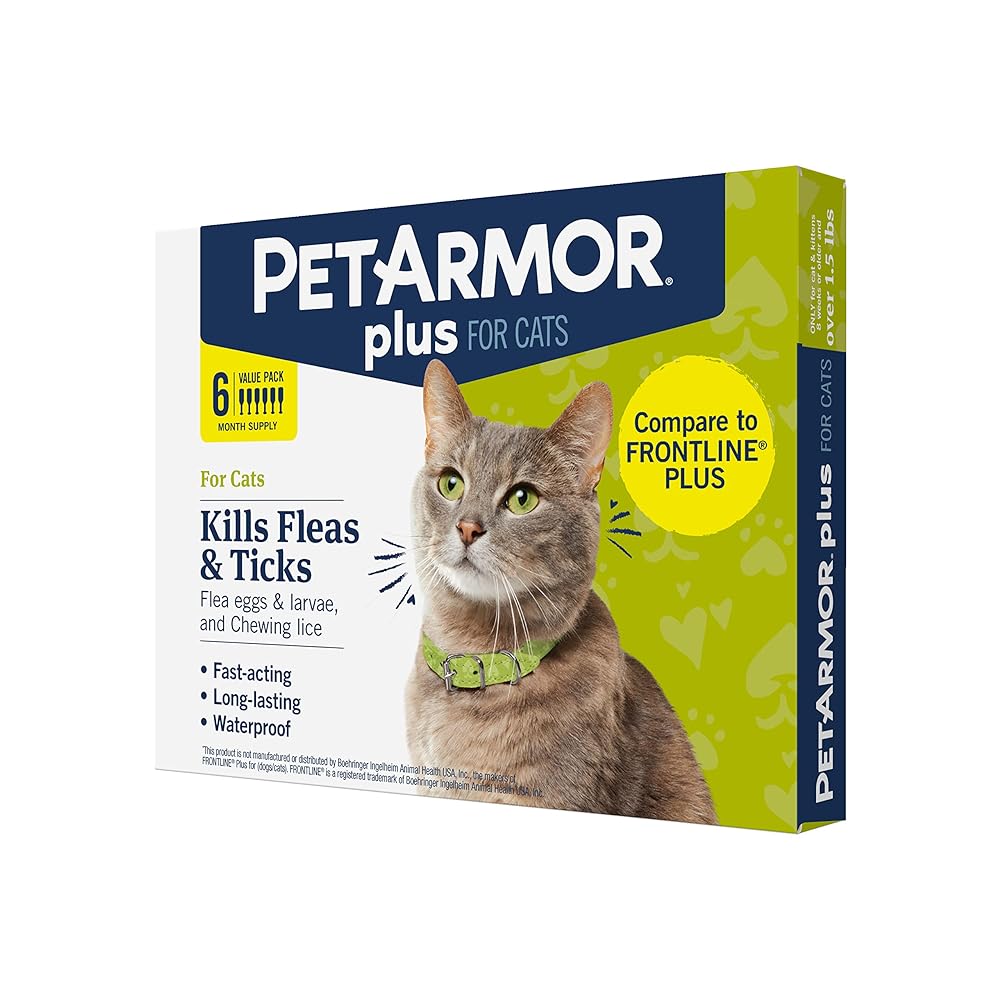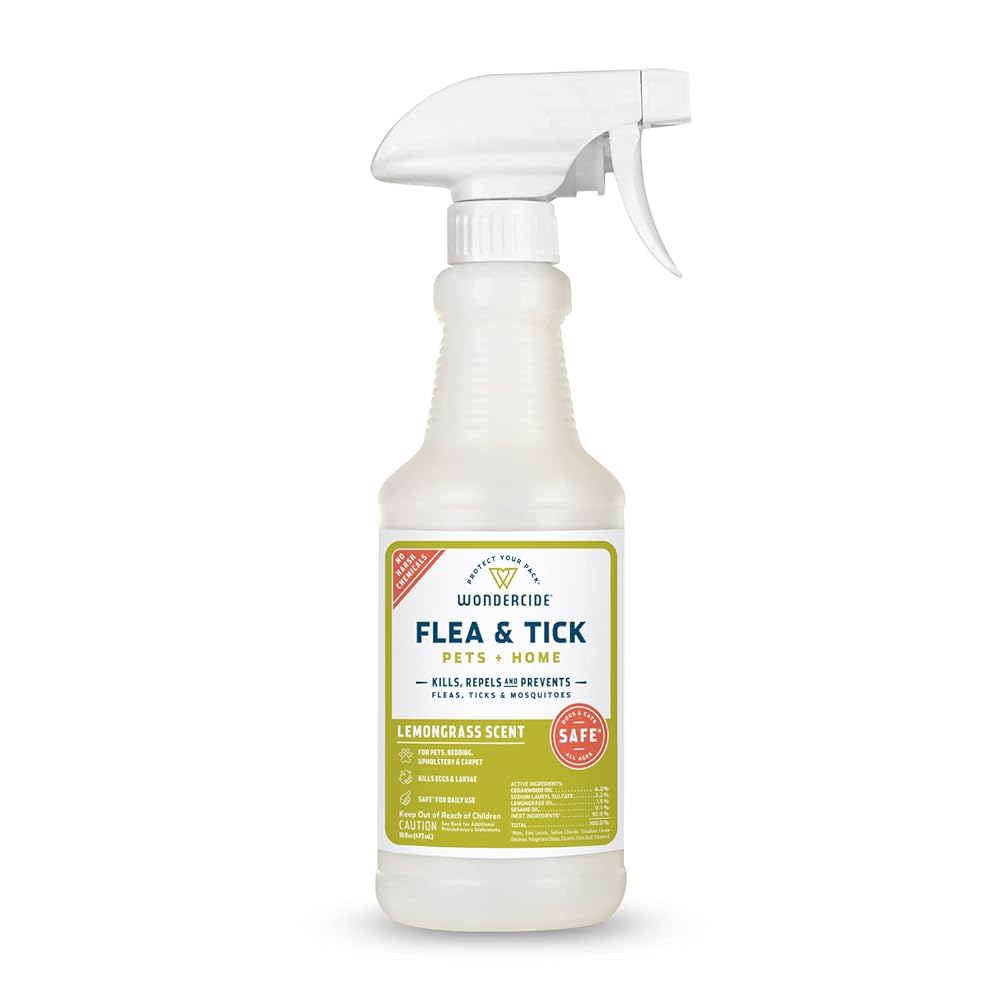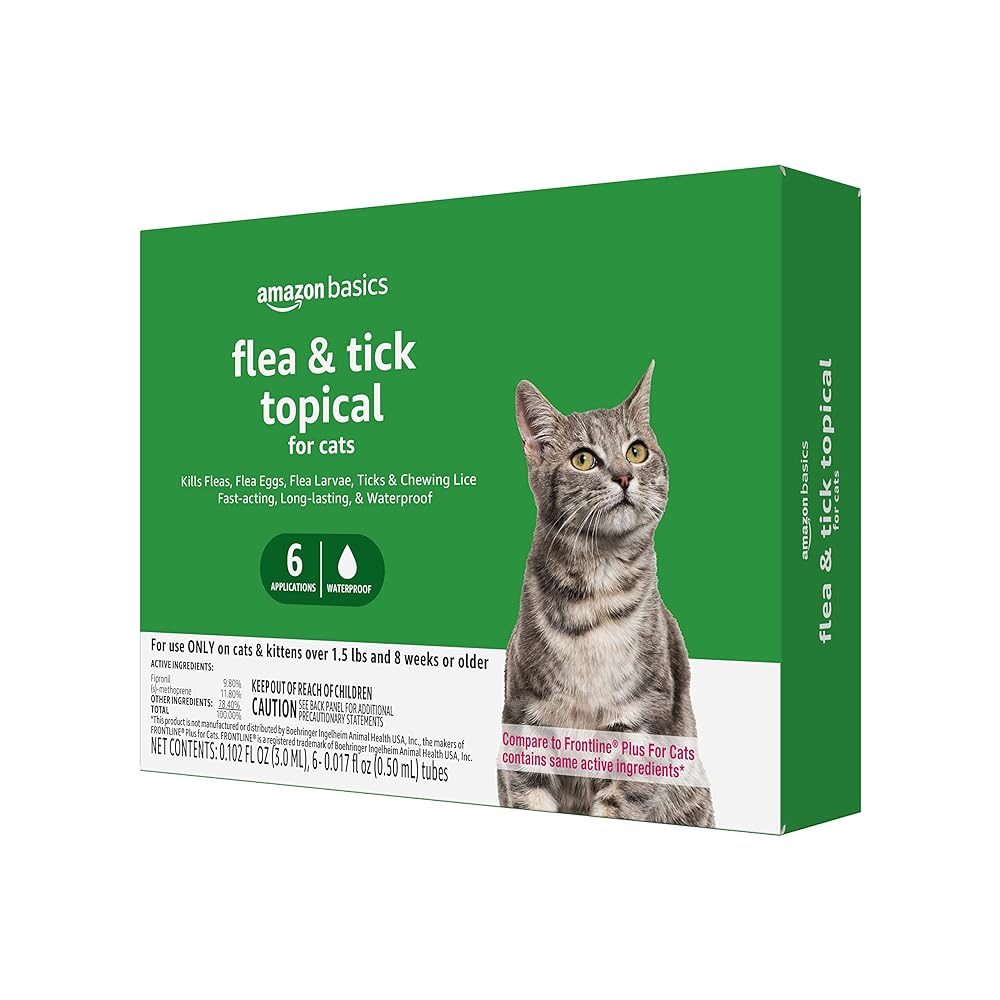iHeartCats is reader-supported. When you buy via links on our site, we may earn an affiliate commission at no extra cost to you.
Fleas are more than just a nuisance; they are a health risk to your cat and even to you. Infestations can lead to various issues, including skin irritation, allergic reactions, and transmission of diseases. With a myriad of flea treatments and medications available in the market, it can be overwhelming to choose the most effective and safe option for your feline friend. This article aims to provide you with a comprehensive guide to the best cat flea treatments and medications, helping you make an informed choice to protect your pet from these pesky parasites.
#1 – Advantage II Large Cat Vet-Recommended Flea Treatment & Prevention | Cats Over 9 lbs. | 6-Month Supply
Advantage II Large Cat is a vet-recommended flea treatment and prevention product for large cats over 9 lbs. It is an easy-to-apply, monthly topical treatment that kills adult fleas, flea larvae, and flea eggs through contact. The product is waterproof, fragrance-free, and provides same-day effectiveness in killing fleas within 12 hours of application.
Best For: Flea treatment and prevention for large cats on a budget.
#2 – PetArmor CAPACTION (nitenpyram) Oral Flea Treatment for Cats, Fast Acting Tablets Start Killing Fleas in 30 Minutes, Cats 2-25 lbs, 6 Doses
The PetArmor CAPACTION is an oral flea treatment for cats that starts killing fleas within 30 minutes of administration. It is safe for kittens and cats weighing between 2-25 lbs and can be used on pregnant or breeding cats. The fast-acting tablets are easy to use and provide 6 doses to efficiently eliminate adult fleas.
Best For: Quick and effective flea treatment for cats.
#3 – Advantage XD Large Cat Flea Prevention & Treatment For Cats over 9lbs. | 1-Topical Dose, 2-Months of Protection Per Dose
The Advantage XD Large Cat Flea Prevention & Treatment is a topical solution that provides 2 months of protection against fleas for cats over 9 pounds. It is designed for both indoor and outdoor cats or kittens over 8 weeks old. The product offers longer-lasting protection compared to other topical treatments and starts killing fleas within 30 minutes to 4 hours. It is easy to apply and does not require a prescription.
Best For: Budget-friendly and effective flea prevention and treatment.
#4 – CAPSTAR (nitenpyram) Oral Flea Treatment for Cats, Fast Acting Tablets Start Killing Fleas in 30 Minutes, Cats 2-25 lbs, 6 Doses
Capstar is an oral flea treatment for cats that starts killing fleas within 30 minutes of administration. It is a fast-acting tablet that is backed by research and recommended by vets to tackle flea infestations. Capstar does not require a prescription and can be used for cats weighing 2-25 pounds.
Best For: Quickly killing fleas for cats on a budget.
#5 – TevraPet Actispot II Flea Treatment for Small and Medium Cats 5-9 lbs | 6 Doses | Powerful Prevention and Control, Clear
The TevraPet Actispot II Flea Treatment for Small and Medium Cats is a waterproof topical treatment that effectively kills fleas, flea eggs, and flea larvae for up to 30 days after each application. It uses the same active ingredients found in Advantage II but at a lower cost. This product is best for budget-conscious cat owners looking for a reliable and affordable flea treatment.
Best For: Best on a budget.
#6 – Hartz UltraGuard Topical Flea & Tick Prevention for Cats and Kittens – 3 Monthly Treatments
Hartz UltraGuard Topical Flea & Tick Prevention is a product designed to protect cats and kittens from fleas, ticks, and mosquitoes. It comes in the form of a topical drop formula that is easy to apply and provides 3 monthly treatments. It is suitable for cats and kittens that are 12 weeks or older and weigh 5 pounds or more.
Best For: Budget-friendly flea and tick prevention.
#7 – FRONTLINE Plus Flea and Tick Treatment for Cats Over 1.5 lbs., 3 Treatments
The Frontline Plus Flea and Tick Treatment for Cats is a waterproof and long-lasting product that provides effective treatment and control for fleas and ticks on cats and kittens weighing 1.5 lbs and over. It not only kills adult fleas and ticks but also eliminates flea eggs and larvae to break the flea life cycle. This trusted product has been recommended by veterinarians for almost two decades and offers lasting protection for a full 30 days.
#8 – PetArmor Plus for Cats, Flea & Tick Prevention for Cats Over 1.5 lbs, Waterproof and Fast-Acting Topical Flea and Tick Medication, 6 Months of Treatment, 6 Count
PetArmor Plus for Cats is a waterproof topical flea and tick prevention medication that is effective for up to 30 days. It contains the same active ingredients as FRONTLINE Plus for Cats and starts killing fleas within 24 hours. This product breaks the flea life cycle and protects cats from various types of ticks.
Best For: Budget-friendly flea and tick prevention for cats. (Best on a budget)
#9 – Wondercide – Flea, Tick & Mosquito Spray for Dogs, Cats, and Home – Flea and Tick Killer, Control, Prevention, Treatment – with Natural Essential Oils – Pet and Family Safe – Lemongrass 16 oz
Wondercide Flea, Tick & Mosquito Spray is a 3-in-1 plant-powered solution that kills and repels fleas, ticks, and mosquitoes. It is made with natural essential oils and is proven to be effective in laboratory testing. This product is safe for dogs and cats of all ages, and can also be used throughout the home to eliminate pests.
Best For: best on a budget
#10 – Amazon Basics Flea and Tick Topical Treatment for Cats (over 1.5 lbs), 6 Count (Previously Solimo)
The Amazon Basics Flea and Tick Topical Treatment for Cats is a budget-friendly product that helps eliminate and prevent flea and tick infestations in cats weighing over 1.5 lbs. This product contains active ingredients that kill flea eggs, larvae, mosquitos, biting flies, and chewing lice, providing up to 30 days of protection with just one application. It is also waterproof, ensuring the treatment remains effective even after exposure to rain and water activities.
Best For: Best on a budget.
What Should I Consider When Choosing a Flea Treatment/Medication for My Cat?
Choosing the right flea treatment or medication for your cat involves several considerations to ensure effectiveness, safety, and suitability for your pet’s specific needs. Here are some key points to consider:
- Consult Your Veterinarian: Before starting any flea treatment, consult your veterinarian for a professional assessment. This is particularly important if your cat is young, elderly, pregnant, nursing, or has any other health conditions that could affect the choice of treatment.
- Type of Treatment: Flea treatments come in various forms, such as topical spot-on treatments, oral medications, flea collars, sprays, and shampoos. Each has its pros and cons, so choose the one that best fits your cat’s lifestyle and your comfort in administering it.
- Age and Weight of Your Cat: Make sure to choose a flea treatment appropriate for your cat’s age and weight. Some medications are not suitable for kittens or may require a different dosage for larger cats.
- Longevity of Protection: Check how long the treatment will protect your cat from fleas. Some treatments offer a month of protection, while others may last longer. Choose one that fits well with your ability to maintain the treatment schedule.
- Safety: Look for products that have a proven safety record. Check for any possible side effects and always read and follow the manufacturer’s instructions carefully.
- Effectiveness: Opt for a treatment that not only kills adult fleas but also tackles eggs and larvae to disrupt the flea lifecycle, providing comprehensive protection.
- Environmental Concerns: Some treatments also come with recommendations for treating your home environment, where flea eggs and larvae may reside. These can add an extra layer of protection.
- Cost: While cost shouldn’t be the primary concern, it’s worth comparing different treatments to see which offer good value for their efficacy and longevity.
- Other Pets: If you have other pets in the home, consider how the flea treatment for your cat will interact with treatments for your other animals. Some dog flea treatments, for instance, can be toxic to cats.
- Allergies and Sensitivities: If your cat has sensitive skin or known allergies, consult your veterinarian for a hypoallergenic or gentle option.
By keeping these factors in mind and consulting with your veterinarian, you can make an informed decision about the best flea treatment for your cat.
What Risks Are There When Using Pesticide-Based Flea Treatments for Cats?
Pesticide-based flea treatments can be effective in eliminating fleas, but they also come with certain risks and potential side effects that you should be aware of:
- Toxicity: The active ingredients in many pesticide-based flea treatments are designed to be toxic to fleas but can also be harmful to cats if ingested or absorbed in large amounts. Symptoms of toxicity can include drooling, vomiting, lethargy, and in severe cases, seizures or even death.
- Skin Irritation: Topical treatments can sometimes cause skin irritation, leading to redness, itchiness, or discomfort at the application site. If you notice these symptoms, consult your veterinarian immediately.
- Allergic Reactions: Some cats may have allergic reactions to the chemicals used in flea treatments. Signs of an allergic reaction can include itching, hives, and difficulty breathing.
- Interactions with Other Medications: If your cat is already taking other medications, especially those for heartworm, the flea treatment could interact negatively with them. Always consult your veterinarian to discuss any potential drug interactions.
- Incorrect Application: Applying the treatment incorrectly, such as using a product intended for dogs, can result in adverse effects. Always read the label and instructions carefully, and consult your veterinarian if you’re uncertain.
- Environmental Impact: Some pesticide-based flea treatments may be harmful to the environment, including being toxic to aquatic life or other non-target animals.
- Residue: There’s a risk of chemical residue being left on surfaces where your cat frequents, which can then be transferred to humans or other pets, though the risk is generally considered to be low.
- Young, Elderly, or Ill Cats: Kittens, senior cats, and those with compromised immune systems or existing health conditions may be more susceptible to the risks associated with pesticide-based flea treatments.
- Pregnant or Nursing Cats: Special caution should be taken when treating pregnant or nursing cats, as the chemicals may affect the unborn kittens or be transferred through milk.
It’s crucial to consult with your veterinarian before beginning any flea treatment, especially pesticide-based options. They can help you weigh the risks and benefits and decide on the most appropriate treatment for your cat’s specific needs.
Frequently Asked Questions About Flea Treatments for Cats
1. What types of flea treatments are available for cats?
Flea treatments come in various forms including topical spot-on treatments, oral medications, flea collars, sprays, and shampoos. Each has its own advantages and disadvantages, depending on your cat’s specific needs and your comfort in administering the treatment.
2. How do I know if my cat has fleas?
Signs of a flea infestation include scratching, biting, or licking excessively, as well as visible flea dirt (tiny black specks) in the fur or on your cat’s bedding. You may also see live fleas on your cat or around your home. If you suspect a flea problem, consult your veterinarian for diagnosis and treatment options.
3. Are over-the-counter flea treatments as effective as prescription ones?
Over-the-counter treatments can be effective but may not offer the same broad spectrum of protection as prescription treatments. Prescription options often tackle flea eggs and larvae in addition to adult fleas, providing more comprehensive control.
4. Can I use dog flea treatment on my cat?
No, you should never use dog flea treatment on a cat. Many dog treatments contain ingredients that are toxic to cats and can cause severe illness or even death.
5. Can I give my cat a flea bath?
While flea shampoos exist, they generally provide only temporary relief and are not a comprehensive solution. Additionally, many cats find baths stressful. Consult your veterinarian for the most effective and least stressful flea treatment options for your cat.
6. How often should I apply flea treatment?
The frequency of application depends on the type of treatment used. Some topical treatments are applied monthly, while oral treatments might be given more or less frequently. Always read and follow the manufacturer’s instructions.
7. Is it safe to use flea treatment on kittens?
Some flea treatments are safe for kittens, but age and weight restrictions apply. Always consult your veterinarian for appropriate treatment options for young cats.
8. Can flea treatments have side effects?
Yes, some cats may experience side effects like skin irritation, vomiting, or diarrhea. In rare cases, neurological side effects like tremors or seizures may occur. Always consult your veterinarian if you notice any adverse reactions.
9. How can I prevent fleas in the first place?
Preventative measures include regularly cleaning your home, vacuuming furniture and carpets, and washing your cat’s bedding. Ongoing preventive treatments, as recommended by your veterinarian, can also help keep fleas at bay.
10. What should I do if flea treatments don’t seem to work?
If you’ve administered a flea treatment according to guidelines and still see no improvement, consult your veterinarian. Your cat may require a different form of treatment or the fleas may have become resistant to the one you’re using.
Conclusion: Best Cat Flea Treatments & Medications
Keeping your cat flea-free is not only crucial for their comfort but also for their overall health. With various options from topical solutions to oral medications and even flea collars, you can choose the one that best suits your cat’s lifestyle and your ease of administration. Always consult your veterinarian to determine the most appropriate flea treatment for your cat, especially if they are young, elderly, or have other health conditions. By taking proactive steps to combat fleas, you can ensure a happier, healthier life for your feline companion.

